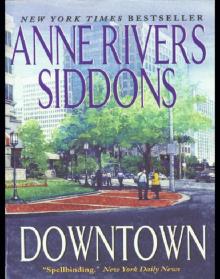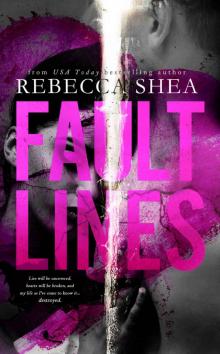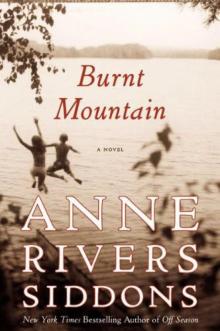- Home
- Anne Rivers Siddons
Burnt Mountain Page 10
Burnt Mountain Read online
Page 10
When I woke I looked into white sunlight on the rose-papered walls that were not my own and for a moment could not think where I was.
“Welcome to the world, sunshine,” said my grandmother’s musical voice, and I turned my head and saw her sitting in Lily’s slipper chair beside the bed, with a laden tray on the footstool beside her. The smell of coffee curled into my nostrils and I swallowed thickly. I knew that I could not drink the coffee, nor, for that matter, eat the eggs and bacon on the plate on the tray.
“Can I have some water?” I croaked. My throat was dry as far down as I could feel it.
She poured from a carafe, ice clinking into the glass, and I took it and gulped it down in one long swallow. For a moment it threatened to come straight back up, and then it settled, and the delicious coolness in my mouth and throat made me close my eyes in pure joy.
“Oh, boy,” I said, smiling at her. “I’ve been thirsty for cold water for at least a week.”
She kissed me on the cheek and pushed a straggle of hair off my forehead.
“I heard it was as hot as sin up there in that valley,” she said. “You’re pale as a little ghost. I’m keeping you inside for a while. We’ll read and watch TV and we can start to get your clothes ready. You’ve only got a month or so before classes start, don’t you?”
“Yes,” I said, thinking that fall and Agnes Scott seemed as far away as the millennium and that Nick would be back before then. I stretched and smiled.
“I’m glad to see you, Grand,” I said. “When is Mother coming back?”
“In a few days. She ran into some people she and your father knew from Hamilton, a student’s parents, I think. They live on the island, and they’ve asked her to stay awhile with them. Doesn’t your friend Nick live somewhere down there? I wouldn’t be surprised if she ran into his father. Everybody knows everybody on the coast.”
“Nick’s in Europe with his father, looking at architecture,” I said. It was delicious to speak of Nick, to use his name, in front of people. “He’ll be back in about a month. He’s starting at Georgia Tech.”
She gave me another hug.
“Things are going well with you two, aren’t they? That’s a happy thing. Is he going to be the one, my dear?”
“Oh yes. Yes, he is. It’s not too soon, Grand. I’m not too young. I know Mother thinks I am, but… I know this. I just know.”
“Well, who better than you, darling?” she said. “He’s going to keep in touch from Europe, of course?”
“Oh yes. Every day. He’ll write almost every day, and he’ll call—Do you know if there’s been a call yet?”
“No, but I’ve just come home, and he’ll think you’re still at camp, won’t he? Give him time to get his feet on the ground. And eat your breakfast. I’m going to get Juanita to help me move you into your own room. Lily’s is lovely, but it’s hardly you, is it?”
Lily’s room was literally a bower. Roses climbed, rioted everywhere, from her bedspread to the curtains and rugs and slipper chairs. My mother loved roses. Her firstborn daughter had little choice in the matter. Fortunately, Lily loved them, too. She was a rose girl from her fair, flushed cheeks to her small pink toes. My room was serviceable blue chambray and blue-striped curtains. My rugs were dark, close-knit blue, as sturdy as iron. Mothers learn a lot with their first daughters, I think. And from the beginning, I had no hint of roses about me.
“Wild red honeysuckle,” my father had said once, when I asked him. I thought honeysuckle was better than roses any day. I still do.
I poked at my breakfast while my grandmother and Juanita carried my things across the hall to my room. I felt boneless, limp, bled of energy. It was not hot in the room with the air-conditioning on, but perhaps the fact that I knew that outside was still a motionless swamp of heat was sapping my body. And, of course, Nick not being here. Without Nick I felt as if half my breath was gone.
Presently I pulled out some faded blue shorts and found a tee shirt in Lily’s drawer. It had roses on it, of course, but it was loose and cool, hardly touching my body. I went out into the hall and started downstairs and met the still, thick heat at the top of them. My head whirled sickly, and I clutched the stair rail and sank down on the step with my eyes closed, waiting for the world to settle.
“What’s wrong, Thayer?” I heard my grandmother say from behind me, worry in her voice.
I shook my head. “I think maybe it’s still the heat,” I said foggily. “It’s really hot in here without the air-conditioning. I don’t think I ever felt it like this before.”
“It’s not that hot,” she said. “I hope you’re not coming down with something. Stay there; I’m going to get you a cold washcloth.”
“Grand…”
“Stay,” she said.
The washcloth felt good, and the dizziness passed. I went on down the stairs and into the kitchen, thinking to snag a cold soda and go down to the riverbank, to check out my small fortress there. I had not thought of it for a long time, but today it seemed welcoming, almost pulling me there.
“I’m going down to the river for a little while,” I said to Juanita, who was stirring something in a blue pottery bowl. “Tell Grand I’ll be back before lunch.”
“You better not stay out there too long,” Juanita said. “The weatherman said it was going to be one-o-six today. You look pretty peaked to me.”
“Back atcha,” I said in mild irritation. “Oh, by the way, have there been any phone calls?”
“Yes, none of ‘em for you. The man’s gon’ come fix the ceiling fan in the hall, and your mama called and said she’d be home tomorrow afternoon….”
I thought of my mother, crisp and cool as a melon in something linen, probably sea green, and her gilt hair pulled back as she always wore it in hot weather. I could not imagine that one drop of sweat had been permitted to stand on her forehead or in the hollow of her throat, much less under the arms of her linen dress. She was the only woman I had ever known on whom linen did not wrinkle. This irritated me even more and I went out the back porch door and let the screen door slam. This always drove my mother wild.
I walked across the long lawn down toward the trees that fringed the river. The grass was spiky and brown under my bare feet, and the earth was actually hot. Above me the sky was high and white and so heat hazed that the sun looked like an orb dropped into milk. No wind stirred the drooping trees. No birds sang. No dogs barked. No lawn mowers buzzed. By the time I reached my little house, still ringed with boughs, in the roots of the big live oak, my head was throbbing with heat and my heart was pounding high in my throat. I leaned down to duck into the little enclosure and felt the world spin wildly again.
When I woke up, Detritus was bending over me, trying to pull me erect, and my soda was pooling on the dry earth beside me. My grandmother was kneeling on my other side, wiping at my face with a damp cloth.
“We’re going to get you right back to bed, darling, and then I’m going to call the doctor. See if you can stand up now.”
“No, Grand, it’s just that it’s so hot…,” I began, and vomited on the earth in front of me.
“You’ll have to carry her, Detritus,” my grandmother said. “I’m going ahead to call the doctor.”
He did, as easily as if I had been a bag of feathers.
“Grand, please don’t call the doctor, I’ll just rest awhile, and then…!” I called to her retreating back.
She and Juanita tucked me into my bed with the window unit grinding out cool air, and I did feel better. My room closed its arms around me, and I felt lulled and far away, as I had sometimes when I was sick as a child and knew that I was being cared for and nothing remained for me to do but lie still on piled pillows. Usually it was my father who sat at my bedside, at night, anyway, and his deep, cool voice seemed to lift me up on waves. Now it was my grandmother’s.
“Dr. Neely says it’s probably heat; he says he’s got half of Lytton down with it. But he said for you to rest today and drink lots of fluids, and
for us to call him in the morning if you’re not better. He feels you will be.”
I closed my eyes and then opened them.
“Has… have there been any phone calls?”
She looked at me steadily for a long minute and said, “No. But you know I’ll tell you if there are. Let it go for a little while, darling. He hasn’t had time yet.”
She brought me iced tea and a couple of aspirin, and I settled back on my pillows and closed my eyes again.
“Do you want the radio?” she said, and I nodded. In a moment the mannerly strains of an old song that I knew my father used to like floated into the darkened room.
“I found my April dream… in Portugal with you….”
“Lisbon Antigua.”
Lisbon, I thought, sliding into sleep. We could go to Lisbon…. Maybe you’ll go this time, and you can take me back another time.
Anywhere you want, Thay. Anywhere you say, Nick whispered. I heard the door close softly as my grandmother went out of my room and I turned over in my bed and into Nick’s arms. I don’t believe I dreamed, but when I woke again I thought for a moment that I was on the top bunk of the cabin at Sherwood Forest and Nick was still sleeping beside me.
I sat up abruptly when my hand reached out and touched, not his warm skin, but a pile of books and magazines. I looked around in confusion and distress and saw my grandmother again, sitting beside my bed. No bunk. No cabin. No Nick. She looked as if she had been there a long time. The entire room was dim and she reached over and switched on my little bedside lamp and smiled at me.
“What time is it?” I mumbled, my voice clogged in my throat.
“After six. You’ve slept all afternoon. How do you feel?”
“Okay,” I said thickly. “Sleepy, but I don’t feel sick. I was sick, wasn’t I?”
“Indeed you were. Do you remember throwing up and fainting in your little tree house?”
“I… guess so,” I said. I could remember, but it was like remembering a dream.
She was silent a little while, not looking at me but at the evening light lowering outside my drawn curtains. Then she turned her head back to me and said, “Sweetie, are you having your period? That can make you pretty sick sometimes, especially when it’s hot.”
“My period? No.”
“Can you remember when you had your last one?”
I couldn’t. I remembered no cramping, no bleeding, no awkward explanations to Nick. What was she talking about?
“No,” I said doubtfully.
She took a deep breath and let it out in a long sigh.
“I don’t like to pry, darling, but have you been… intimate with Nick?”
“I… I guess so….”
“For very long?”
I began to see where this was going. My heart slowed to huge shuddering thuds and my eyes blurred.
“I guess… since right at the first,” I whispered. “But Grand, we always used… I mean he used, you know, those things….”
I could not say “condoms” to my grandmother.
She leaned over and put her hands on either side of my face and looked into my eyes. My eyes, so like hers, so like my father’s…
“My darling, they don’t always work. Not always.”
“But that would mean… I mean, do you think I could be…”
I could not say “pregnant,” either.
She still cupped my face but did not speak.
“But that would mean a baby!”
“Yes, it would,” she said. Tears stood in her eyes.
I felt nothing but a sort of white shock buzzing in all my veins. There was nothing at all real about any of this. We were acting in some sort of play, an old, sweet one, like Our Town. Grandmother and granddaughter in a lamp-lit room, talking about…
“I didn’t know babies made you sick,” I said stupidly.
She sighed and leaned back in the chair and covered my hand with hers. She closed her eyes and then opened them and said, “We must talk a little about what you want to do, before your mother comes home,” she said. “Of course it’s entirely possible that it’s not that at all, but we have to decide some things now, before we tell your mother. There’ll be many plans to make, and the choices should be yours.”
“Plans?” I said, and a wild joy bloomed inside me. It felt sweeter than anything I had ever felt before, or tasted. “We’ll get married now instead of waiting, Grand! We were always going to get married. We were always going to have children. We’ll just do it now instead of after college. He can go on to Tech, and I can…”
She was shaking her head, back and forth. Tears spilled out of her eyes now and ran down her cheeks.
“Thayer, you are not eighteen yet. It’ll be a while till you are. Your mother isn’t just going to let you run off and get married in two or three months or so, or whenever Nick gets back. And do you really think you could begin right now to take care of a baby? You must realize that if this is true your whole life will change. The main thing is to decide if you want to keep this baby—”
“Of course I do! What else would I do with it? Even if we don’t get married yet, Nick will love it….”
My voice was rising and my heart was pounding so that I could not get my breath. I knew without being able to see it that my face was red and furious and corrugated.
“Darling, your mother—”
“Don’t tell my mother! Don’t you dare tell my mother!”
I was almost screaming.
She pulled my face back into her shoulder. It felt the same: warm, safe. She still wore Vetiver.
“This will work out, sweetheart. I promise you that. But your mother will have to know. Of course she will. I’ll talk to her first. But your mother will have to know.”
“But what if it’s not true? Then we would have told her and it wouldn’t be true at all, and it would be just awful….”
“Well, the first thing you’ll have to do is find out.”
“Can’t you do that? Can’t you help me do… whatever…”
“No. Not for this. This has to be your mother. But I can tell her for you. Tell her first. I think that might help a little. And you might be surprised. She might understand far better than you think she will.”
“No,” I said, beginning to tremble hard. “She won’t.”
I spent that night and the next day in a maelstrom of emotions, so vivid and conflicting that I could almost see them, like swirls of violently colored water heaved up by a great whirlpool: simple disbelief that such a thing could happen to me, fear of my mother’s outrage and my own ineptitude as any sort of a parent, a joy so fraught with tenderness at the idea of Nick’s and my baby that it made me weep. The heat outside had not abated and the nausea was back, crawling and lingering at my throat. Grandmother and I scarcely spoke of the day before, but once when I leaped for the telephone and almost fainted on the floor she said wearily and tenderly, “It won’t be him until the day after tomorrow, darling. You weren’t supposed to be home from camp until then. Give yourself a break. I think it would be best if you didn’t talk to him until after we know one way or another, anyway. I’m going to give you half a sleeping pill, and then when your mother comes in tonight I’ll have that talk with her. I expect that even if she doesn’t much like it she’ll understand.”
I simply shook my head, unable to fathom that my grandmother really believed that my mother would understand. Not when the mere name Abrams had seemed to burn her lips. But, in fact, she did. Or at least, she did not seem to be angry.
She was sitting beside my bed the next morning in the same chair Grand had been sitting in, drinking coffee and staring out my window into the heat-shabby treetops. I was right about the linen and the hair, only this morning it was a peach shirt and white slacks and her hair was tied back with a scarf of the same peach. She was tanned to honey gold, and when I made a small sound and she turned her head toward me the blue-violet of her eyes was startling in the shade-drawn gloom.
“Well, Thayer,”
she said, and sighed. But she did not frown. She simply looked at me, rather, I thought, as if she had never seen me before.
“Mama…,” I began, and then, to my disgust and horror, began to cry. And then threw up on the bedspread.
I continued to cry, nearly strangling on my own sobs, while she whisked away the bedspread and brought a towel and a wet washcloth for me and called downstairs for Juanita.
“Not Juanita!” I hiccupped. “Grand! Can’t you call Grand?”
“Don’t be silly, Punkin,” she said crisply, but her touch with the washcloth on my face was gentle. “This is what Juanita was hired for. Besides, your grandmother is at her doctor’s appointment. I know all about it. Your grandmother and I talked last night.”
Punkin had been my father’s nickname for me when I was small. I had never heard my mother use it before. I stared at her, sniveling. After Juanita had gone with the soiled bedspread, careful not to look me in the eye, my mother said, “Now. The first thing to do is to find out what’s what. It could easily be something else, you know.”
“It isn’t something else,” I whispered. “I know it isn’t. But Mama, it’s all right! It is! We wanted children; when Nick gets home—”
“Shhhh.”
She laid her finger over my lips. “There’s plenty of time to talk about what comes next after we’ve seen the doctor. That’s number one. We’ll go from there.”
I said nothing. I could not have asked for a better reaction, at least not from my mother, but none of this rang right, felt real. The feeling of being in a play intensified. But this time not Our Town.
“I’m going to have Juanita bring you up a tray,” she said, rising. “I want you to try and at least eat some toast. Then jump in the shower. We have an appointment at three this afternoon to see the doctor.”
“Not Dr. Neely!”
“No, of course not. This man is in Atlanta, and he’s supposed to be the best. Several of my friends’ daughters have used him, and I understand he’s the ob-gyn for Buckhead.”

 Colony
Colony Nora, Nora
Nora, Nora House Next Door
House Next Door Homeplace
Homeplace Downtown
Downtown Peachtree Road
Peachtree Road Sweetwater Creek
Sweetwater Creek Fault Lines
Fault Lines Low Country
Low Country The Girls of August
The Girls of August Burnt Mountain
Burnt Mountain Islands
Islands